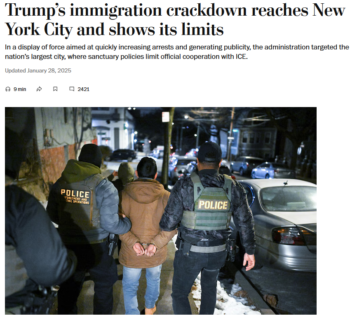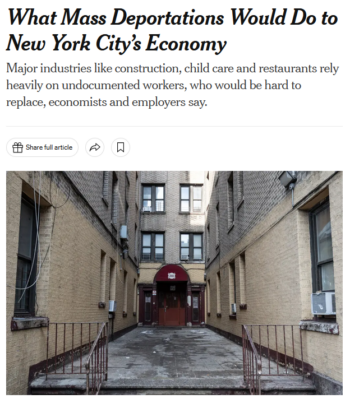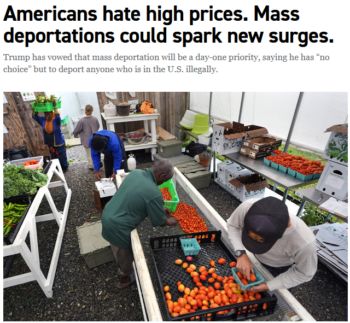
A non-hypothetical headline from the centrist Peterson Institute for International Economics (9/26/24).
“GDP Could Take Massive Hit as a Result of Mass Deportations.” “Mass Deportations Could Leave Many Americans Without Jobs.” “Mass Deportations Could Spur Spike in Inflation.” “Mass Deportations Could Cost Nearly $1 Trillion.”
These are hypothetical headlines of the sort you run if you want to drive home the point that mass deportations would not only be a humanitarian outrage, but an economic disaster. Which, according to economists, they very much would be.
As of 2022, undocumented immigrants constituted approximately 5% of the US workforce. Deporting all or a large number of them would substantially reduce the supply of labor in the US economy and would concurrently reduce aggregate demand by eliminating the spending of anyone deported. GDP could, as a result, drop as much as 7.4% below a baseline forecast by the end of 2028, per the Peterson Institute for International Economics.
Rather than opening up more job opportunities for American workers, past research tells us that the opposite will occur. As Michael Clemens from Peterson puts it:
The disappearance of migrant workers…dries up local demand at grocery stories, leasing offices, and other nontraded services. The resulting blow to demand for all workers overwhelms the reduction in supply of foreign workers.
The supply shock induced by mass deportations of undocumented workers would have the additional effect of spiking inflation, perhaps several points above baseline. In short, beyond being a humanitarian nightmare, mass deportations would be an economic self-own of epic proportions.
Rather than sound unfamiliar or strange, as it may to readers of corporate media, this sort of expert analysis of the economic effects of deportation could become conventional wisdom if outlets ran headlines like those above. After all, those are the type of headlines you run if you are dedicated to objectivity in reporting, to informing your audience of what the research says, no matter whether it might offend their sensibilities.
‘Warning of a fiscal crisis’

Writing about the prospect of mass deportation in New York City, the Washington Post (1/28/25) highlighted Mayor Eric Adams’ “warning of a fiscal crisis.”
They are not, of course, the headlines you run if your paper is committed to bending over backwards to avoid offending Trump and his supporters. So at the Washington Post, such headlines are hard to come by. In fact, if you look through the “Immigration,” “Economy” and “Economic Policy” sections on the Post’s website, you will find a grand total of zero articles since the start of the year with headlines directly addressing the negative economic impact of Trump’s proposed mass deportation policy.
Some articles published over this period have addressed the economic effects of mass deportations, but only in a marginal way. For instance, in an article (1/31/25) published at the end of January about an ICE raid at a workplace in Newark, New Jersey, the Post included the following quote from Newark mayor Ras Baraka:
“How do you determine…who is undocumented and who is criminal?… In this community, you might pull everybody over, because this is a city full of immigrants,” Baraka, who is running for governor of New Jersey, said in an interview. “You got everybody on edge around here. And it’s going to hurt the economy.”
What would the economic damage look like? The Post declined to elaborate.
Similarly, a piece (1/28/25) from a few days earlier about an ICE raid in New York City had little to say about the impacts of mass deportations on the economy. It did, however, take some space to highlight negative economic effects of illegal immigration on the city, explaining that “the largest influx [of migrants] since the Ellis Island era…left New York Mayor Eric Adams (D) warning of a fiscal crisis.” The only economic figure cited in the piece was the figure for the cost of the migrant influx, apparently over $5 billion since 2023.
Cautiously ‘wonky’

“So much recent political rhetoric has succeeded in portraying undocumented people as driven to crime rather than contribution,” the New York Times‘ Ginia Bellafante (1/31/25) noted.
Contrast this coverage with that of the Post’s competitor, the New York Times. At the end of January, the Times published a piece (1/31/25) headlined “What Mass Deportations Would Do to New York City’s Economy.” A far cry from the hypothetical headlines provided at the top of this article, the headline nonetheless signaled an intention to seriously analyze the economic effects of mass deportations. The first economic figure cited in the piece, coming in the third paragraph, highlighted the tax contributions of undocumented immigrants:
As a group, undocumented immigrants paid $3.1 billion in New York state and local taxes in 2022, for example, a sum equal to the city’s early education budget for the current fiscal year.
Not wanting to come off as too activist for citing data on the positive contributions of undocumented immigrants to New York City’s tax base, the Times felt obliged to clarify that this figure did not come
from a left-leaning human rights group intent on fostering sympathy for people who crossed the border illegally, but rather from the wonky Institute on Taxation and Economic Policy, a nonpartisan Washington think tank.
An odd way of presenting data, but a way that evidently feels comfortable for a paper that has no intention of seriously rocking the boat, even if it is willing, on this occasion, to stand up from its seat rather than clinging to the captain’s feet for dear life.
Despite some apparent hesitancy, the piece went on to examine the loss in local and state tax revenue that could result from deportations of even a fraction of the undocumented population, and to explain the centrality of undocumented workers to key industries in the city, from food services to childcare to construction. None—I repeat, none—of this information could be gleaned from the Post’s coverage of the immigration situation in New York City.
‘Recast the US economy’

A Washington Post subhead (11/6/25) said that Trump’s deportation plans might “recast the US economy”—which turns out to mean shrinking it by as much as 6%.
In a major piece on Trump’s approach to the immigration system published just before Trump’s inauguration, the Washington Post (1/19/25) likewise failed at its basic task of informing its readers. The Post at least mentioned that mass deportations could hurt the economy—“By rounding up immigrants who fill otherwise vacant jobs, [Trump] could hurt the US economy he has pledged to supercharge”—but that’s where the analysis ended. No reference was made to research showing that mass deportations could lead to complete stagnation of GDP during Trump’s time in office, or that it could lead to a several percentage point spike in inflation.
Prior to the start of the year, the Post had published more about the economic effects of mass deportations. For instance, an article (12/27/24) from the end of December headlined “The 2025 Economy: Five Things to Watch” included “Deportations” as the second thing to watch. It nonetheless featured only a small discussion of the topic—four short paragraphs—and no hard numbers were cited regarding the effects on employment, GDP and inflation, despite these numbers existing in reputable research from a nonpartisan think tank.
A Post piece (11/6/25) from a day after the election, meanwhile, had discussed how mass deportations could “recast the US economy and labor force”—what a verb! Towards the end of the article, the reporters touched on the effects of mass deportations on inflation and GDP, citing concrete numbers for the second variable:
Many economists also say that mass deportations on the scale proposed by Trump would trigger inflation in the short term—by forcing employers dealing with labor shortfalls to raise prices. A major deportation program would also shrink the economy by 2.6% to 6.2% a year, according to a recent review of projections published by the University of New Hampshire.
This paragraph, however, was all that was given for a concrete discussion of the economic impact of mass deportations.
Amazingly, before the election, the Post editorial board (10/24/24) did take the time to weave in commentary on Trump’s mass deportation policy in yet another editorial fearmongering about Social Security. The board wrote:
Whatever you think about its merits as immigration policy, a crackdown on undocumented workers, including mass deportations, could also hurt Social Security’s finances because undocumented workers contribute payroll taxes without collecting benefits for decades—if ever.
No other economic effects of mass deportations were mentioned by the editorial board. A substantial hit to GDP, though relevant to the discussion of public finances, was not discussed. Concerns about the effects of mass deportations were merely looped into apparently more pressing concerns about the sustainability of Social Security, which the Post wants to cut (FAIR.org, 6/15/23).
‘Not about wages’

NPR (1/17/25) looked at the economic problems posed by mass deportation through the eyes of employers who depend on exploiting immigrant labor.
The Post has been particularly egregious in ignoring the topic of the economic impact of mass deportations, but it certainly hasn’t been alone in covering it poorly. NPR, for example, decided to let employer propaganda slide unchecked in a recent piece (1/17/25) about the contributions of immigrants to Nebraska’s economy.
The piece started by centering the experience, not of immigrants, but of the executive director of the Nebraska Pork Producers Association, Al Juhnke, whose main concern appears to be maximizing the availability of cheap labor for the agricultural industry in Nebraska. An early paragraph read:
Juhnke says attracting workers to Nebraska is not about wages. The average pay for a meat trimmer is close to $18 an hour—well above the state minimum of $13.50. “These are good paying jobs in the plants,” he says. “People say, ‘Well, just double or triple the pay [and] you’ll get United States citizens to work.’ No, you won’t.”
There is no follow up on this point; it is simply accepted as fact by NPR. But there’s little reason to trust an executive of an organization advocating for pork producers on this.
Responsible coverage might at the very least entail bringing in an independent researcher to comment on this claim. For instance, it could be noted that, according to the MIT Living Wage Calculator, the living wage in the county of Nebraska where much of the meat processing occurs is $18.64 per hour for a single adult with no children. For a family with one working adult and one child, it’s $32.27. Such information immediately undermines the executive’s claim that a wage of “close to $18 an hour” is a good wage, and in turn should raise eyebrows at the idea that raising the wage would have no effect on the attractiveness of employment to US citizens.
Survey results from the Manufacturing Institute and Colonial Life, furthermore, indicate that manufacturing companies have seen success in recent years in attracting workers by increasing pay and benefits. Why should we assume meat processing plants face different dynamics from other manufacturing plants?
More to the point, for an article focused on undocumented immigrants’ plight, it would be worth following up this claim, and the surrounding text discussing Nebraskan employers’ search for cheap immigrant labor, with an analysis of the exploitation of immigrant labor.
A follow-up question to the executive might be: Can employers afford to pay workers, immigrant or not, substantially more? And if so, why are they not doing that?
All that the piece gives, however, is a quote from a civil rights advocate lamenting the dehumanization of immigrants: “It’s dehumanizing—‘Let’s harness immigrant labor.’ Like an animal.” This is a powerful quote, but it’s not a substitute for basic factchecking of an empirical claim.
‘Real economic crisis’

Even while pointing out the inflation threat posed by mass deportation, Politico (1/20/25) allowed the Trump team to promote dubious numbers from an anti-immigrant hate group.
Though also better than the Post, in that it has actually prominently covered the negative economic effects of mass deportations in the “Economy” section of its website recently, Politico has similarly engaged in sloppy reporting, failing to provide skepticism where it is needed. In an article headlined “Americans Hate High Prices. Mass Deportations Could Spark New Surges,” Politico (1/20/25) did highlight how much of a disaster Trump’s deportation policy could be for the economy. But it quickly turned the issue into a both-sides debate and, crucially, left unchecked a particularly wild claim:
Some Trump allies say the doomsaying over the incoming president’s pledges to deport as many as 20 million undocumented immigrants is overblown. Karoline Leavitt, a spokesperson for Trump’s transition team, said in a statement that the “real economic crisis is the $182 billion American tax dollars spent each year to cover the costs of 20 million illegal immigrants that have flooded our communities and replaced American workers.”
This claim—that undocumented immigrants impose a $182 billion cost on American taxpayers—was not discussed further. Politico just let it sit. It appears the figure comes from an organization called the Federation for American Immigration Reform, a far-right advocacy group, which was claiming 15 years ago that undocumented immigrants cost American taxpayers over $100 billion per year.
A later estimate from 2013 by the Heritage Foundation, the conservative think tank that’s behind Project 2025, put the figure closer to $50 billion. But even that number is controversial—it includes, for example, the cost of government-provided educational services received by the children of undocumented immigrants, many of whom are US citizens. Educational services, in fact, constitute the majority of the costs associated with undocumented immigrant households in the Heritage analysis.
The amount spent on direct transfer payments to such households is only a small fraction of the estimated overall cost. Other categories of cost include spending on police, fire and public safety, as well as transportation services and administrative support.
The liberties that conservative researchers take in deciding what to count as a cost imposed by undocumented immigrants on US taxpayers make one question the utility of this accounting exercise in the first place. As one researcher has commented:
Fundamentally I think it’s the wrong question…. You’re talking about people who work for very low wages and are excluded from nearly all social services. It takes a real act of will to say they’re exploiting us.
Yet for Politico, none of this context is worth bringing into the piece. Even a basic attempt at factchecking the claim from a Trump ally is absent.
Support declines with details
When respondents were asked about worker shortages, support for mass deportation went from net 7 points positive to 5 points negative (ABC, 1/29/25).
If this sort of coverage—ignoring the issue at the Post, shying away from hard-hitting coverage at the Times, and allowing the story to be warped at NPR and Politico—is going to be the norm for coverage of the economic impact of Trump’s extremist immigration policies, there is little hope for an informed US public on this issue.
Currently, the public appears broadly supportive of mass deportations—that is, if you ask them directly and provide no further details. However, once more details are given, support for mass deportations declines.
One poll from about a month ago gauged support for the following policy: “Detain and deport millions of undocumented immigrants.” It found 52% of Americans in favor and 45% opposed. But with the addendum “even if it means businesses will face worker shortages,” the result changed to 46% in favor, 51% opposed. The effect of including other information about the negative economic effects of mass deportations was not tested, but it seems highly probable that other information—like the potential for a hit to GDP or a spike in inflation—would similarly turn Americans against mass deportation policy.
The problem is, the details about the potentially disastrous economic effects of mass deportations are likely known by only a small minority of the population. If corporate media outlets took their job seriously, they would make those details very well known. That could have major political effects, and could help turn the tides against extremist immigration policies.
Failing to inform the public likewise has major political effects. Passivity means greater leeway for Trump and his backers to shape public opinion, with their claims perhaps continuing to go unchallenged by outlets like Politico. Elon Musk, for one, is known as a prolific propagator of anti-immigrant conspiracy theories, and has frequently used X to amplify his message in the past. If corporate media fail to confront such misinformation, they effectively acquiesce to its corruption of the popular consciousness.
Ultimately, it’s up to corporate media to make a decision about what journalism means to them. They can’t escape making a decision with significant political consequences—political consequences are coming no matter what. But they can decide whether they care more about not appearing political to Trump supporters, or about protecting millions of people—and the health of the US economy.
This content originally appeared on FAIR and was authored by Conor Smyth.
Conor Smyth | Radio Free (2025-02-07T23:41:45+00:00) Media Fail to Inform About Disastrous Economic Effects of Mass Deportations. Retrieved from https://www.radiofree.org/2025/02/07/media-fail-to-inform-about-disastrous-economic-effects-of-mass-deportations/
Please log in to upload a file.
There are no updates yet.
Click the Upload button above to add an update.
